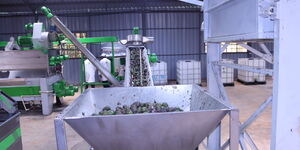Importers of refrigeration and air conditioning gases will not be able to import hydrochlorofluorocarbons (HCFCs) refrigerant from January 2026, the National Environment Management Authority (NEMA) has announced.
In a statement released on Wednesday, December 18, NEMA revealed that 2025 would be the last year allowed for Kenya to import HCFC under the Montreal Protocol and the attendant amendments.
All importers of refrigeration and air conditioning gases were also reminded to apply for their annual import licenses for the year 2025 from NEMA. The deadline for the applications is February 28, 2025.
"Importers are hereby reminded that the phase-out date for importation of HCFC for Kenya is 1st January 2026," the statement read.
Dealers in refrigeration who fail to obtain a licence and continue to deal with HCFC refrigerants will be found to be in breach of the law under the Environmental Management and Coordination (Controlled Substances) Regulations, 2007.
The Regulations are NEMA's way of regulating the production, trade and use of controlled substances and products while also providing for a system of data collection to facilitate compliance with relevant reporting requirements under the Montreal Protocol on Substances that Deplete the Ozone Layer.
Hydrochlorofluorocarbons, or HCFCs, are chemicals that are mainly used as refrigerants. Unfortunately, releases of HCFCs deplete the earth's protective ozone layer and contribute to climate change. R-22 is an HCFC refrigerant that is often used in air-conditioning equipment.
According to the United States Environmental Protection Agency, HCFC emissions have contributed to the erosion of the ozone layer, which shields the Earth from the sun's ultraviolet radiation.
Advanced countries like South Korea are working to develop alternatives to HCFCs as components in cooling systems for refrigerators. Recently, an integrated ultra-high-speed compander, used in air refrigeration, was developed, and researchers predict it could be a game-changer.
Through the modern system, it is possible to achieve a temperature of -60 degrees Celsius using nothing but air as a refrigerant.
In Africa, some countries have already begun the phase-out of HCFC gases. In Zimbabwe, for example, the government has completely banned the importation of the gases as part of a phase-out management plan to preserve the ozone layer and improve energy efficiency.
According to the Zimbabwean government, the nation is expected to be free of HCFCs by 1 January 2030, a move that is anticipated to yield significant climate benefits.












